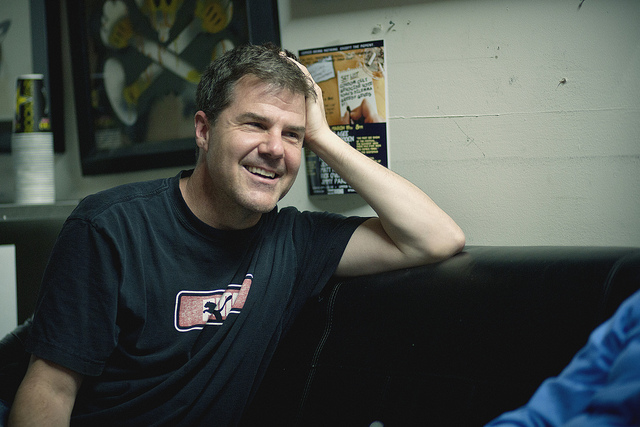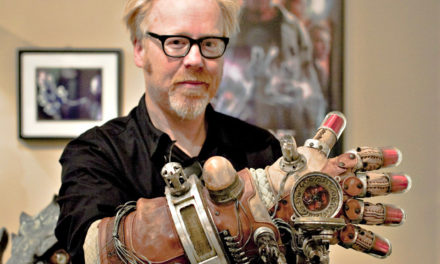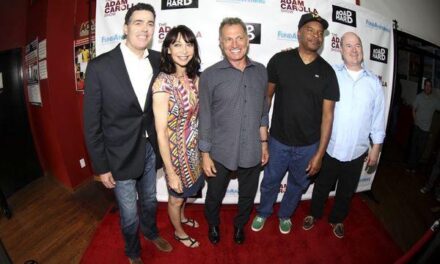If you’re in my demo, you probably know Paul Gilmartin as the co-host of TBS’ Dinner and a Movie. Throughout the show’s 16-year rotating cast of on-air collaborators (Annabelle Gurwitch, Lisa Kushell and Janet Varney), he was the one steadfast element. His understated sarcasm, and subtle crudity, made for some memorable interstitial filler.
Unbeknownst to much of the viewing public, Gilmartin was struggling off-camera with debilitating depression and alcoholism. A couple years back, he tackled those demons head on and brought the knowledge he garnered in recovery, along with his trademark gentle irreverence, to the air waves.
His podcast, The Mental Illness Happy Hour, is a weekly dialogue on emotional and physiological health. It’s full of humor, personal struggle, and above all, human vulnerability. He talks with celebrities and listeners alike about their battles with the sneakiest of adversaries, our own minds.
If you think WTF lacks intensity, and could challenge the human psyche a bit more, this show should be right up your alley. It has a solid five-star rating on iTunes, and the reviews aren’t exactly harsh: “I don’t know how to say this another way: [Paul Gilmartin] is doing God’s work.”
Paul graciously answered a few questions for me last week about the show.
- First things first: How are you feeling these days?
Not bad. My shrink added a new med, Lamictal, which causes a little hypomania at first but has settled down.
It’s the best medium to talk about the subject matter in a way that is intimate and not bound by time constraints.
- Presumably, with the show being what it is “a waiting room that doesn’t suck” your fan base has grown to include more people who are intimately familiar with depression and mental illness. Did you feel equipped for that transition? And what’s been the most difficult part?
Though the numbers have increased, I don’t feel like my audience has changed that much from the beginning. Maybe the audience is a bit more female than it used to be. It used to be a little more male. Probably because the first exposure I got was on male friends’ podcasts. I think the most difficult part is covering a variety of topics and keeping it compelling. The bar was set pretty high by some incredible guests in the first year and I try to maintain it.
- Your decision to have listeners on as guests has made for captivating, relateable pod. What prompted you to take the show in this direction?
Probably the emails I got from them. I saw that their stories and issues were every bit as compelling as those of people who are familiar to me. I think it started with the episode with Nadereh. She was my first listener/guest and she had contacted me. Her episode was soo compelling to me.
- On a recent episode, you mentioned you felt a little uncomfortable reading some of the more adult aspects of the emails the “shame and secret survey” you have on your site produced. Could you talk a little about that survey, and what kind of feedback you’re getting about it from your listeners?
The survey is really interesting but sometimes can get pretty sexually graphic and that can be a little triggering to me, as someone who has experienced sexual exploitation as a child. The majority of people who emailed me said they like the part of the survey where people share their sexual fantasies. So I have to weigh their needs with my needs and I haven’t really made a decision yet as to whether or not to keep that question in the Shame and Secrets survey.
- Speaking of feedback, your iTunes reviews are pretty phenomenal. Are you getting ANY negative responses to the show?
I feel really really lucky to get such positive reviews. I think it has to do with the gentle nature of the show. I try not to put out angry or accusatory vibes on the show, and I think the fact that people consider it a pretty judgement free zone, they go easy on judging me. There are some negative ones, but I think out of like 1900 ratings, about 1800 are five stars. I can take some credit for creating a safe place for guests to get honest but ultimately my guests are what make the show. If they don’t open up and get vulnerable, there is no show.
- You’ve had a unique career; you started in stand up and spent a large portion of it (16 years I think) as co-host of a popular TBS program. What did you draw from those years that inform you as a podcaster?
That people want to know what’s really inside another human being; to get a sense of who they are; to feel like they know them and to feel like that person isn’t presenting a facade (unless the facade is satirical). Even stand-up comedy, the ones who really connect to audiences are the ones who make the audience feel like the performer is saying “we’re in this together”.
- What’s next for Paul Gilmartin?
Keep doing the show, trying to grow it creatively and financially so it can support me. Ultimately I feel like the former will take care of the latter.
—
Follow Paul on Twitter @mentalpod






